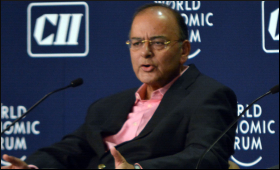|

|
Steps taken by govt to boost economy will start reflecting soon: FM
|
|

|
|
| Top Stories |
 |
|
|
|
Saurabh Gupta | 06 Nov, 2014
Speaking about economic reforms, the Minister of Finance, Corporate Affairs and Defence, Arun Jaitley Wednesday said that the ground results of the steps taken by his government will
start reflecting soon.
Speaking at the inaugural session of the
India Economic Summit organized by the World Economic Forum and the
Confederation of Indian Industry in New Delhi on Wednesday,
he said, "I am satisfied that my government has begun the long journey
of reforms. Reforms are not about a few big bang ideas, although a
single bad step can damage the economy." He believed that the ground
results of the steps taken by his government will start reflecting soon.
He
was interacting with Klaus Schwab, Founder and Executive Chairman,
World Economic Forum. Asked how the new government planned to tackle
the systemic failure caused by corruption, the Minister said that the
government's actions had been aimed at eliminating discretion.
He
gave the example of the coal ordinance by which rules had been set for
allocation of mining licenses, first to the state sector and then to
actual users through e-auction. Commercial mining by private investors
is also envisaged. He said that similar reforms are being planned for
other minerals.
With regard to the issue of privatization and
greater access to foreign investors, he said that currently the
government is following the approach of divestment rather than outright
privatization. However, he would be open to loss-making public sector
units being sold off. As far as access to foreign investors is
concerned, the government would follow a sectoral approach. Most
recently, the limit on foreign investment had been raised to 49 percent
in the defence sector while the Insurance Bill was awaiting passage in
Parliament. Railways and real estate are two other sectors where foreign
investment had been eased.
Answering a question on how he
proposed to ease the bottlenecks created by the land acquisition bill
introduced by the previous government, he said that he would focus on
easing the procedural complications. He had no quarrel with the increase
in compensation proposed by the law. In particular, he would need to
deal with the provision that disallows private schools, hospitals and
hotels on land acquired by the government. Such a provision would make
it difficult to build smart cities being proposed by the government.
He
also explained in detail India's position on trade facilitation, saying
that there is no ideological opposition on this issue. Even without a
commitment to WTO, India would unilaterally support moves to facilitate
trade. However, a solution is required to the dispute regarding holding
of food stocks by India. The peace clause should not be phased out till
this dispute is settled. Replying to a question on whether India’s
subsidies are sustainable, he said that the government is already
rationalizing some subsidies. However, they cannot be eliminated in a
poor country like India.
He said that it is far more challenging
to implement reforms in a developing society, as public opinion cannot
be confronted. For example, while some steps had been taken to reform
labour laws, others in the political system needed to be convinced in
order to move further in that direction. He reiterated his view that
reforms are the art of the possible.
He concluded with a
discussion on how India’s relations with Pakistan had deteriorated on
account of actions taken by Pakistan. While India had shown its
willingness to normalize relations with its neighbor, Pakistan had
created an unaffordable cost for itself by worsening the border
situation.
The Minister was earlier welcomed by Viraj Mehta,
Director, Head of India and South Asia, World Economic Forum and by
Chandrajit Banerjee, Director General, Confederation of Indian Industry.
|
|
|
| |
|
|
|
|
|
|
|
|
|
|
|
|
|
|
| |
| Customs Exchange Rates |
| Currency |
Import |
Export |
US Dollar
|
66.20
|
64.50 |
UK Pound
|
87.50
|
84.65 |
Euro
|
78.25
|
75.65 |
| Japanese
Yen |
58.85 |
56.85 |
| As on 13 Aug, 2022 |
|
|
| Daily Poll |
 |
 |
| PM Modi's recent US visit to redefine India-US bilateral relations |
|
|
|
|
|
| Commented Stories |
 |
|
|
|
|
|
| |
|